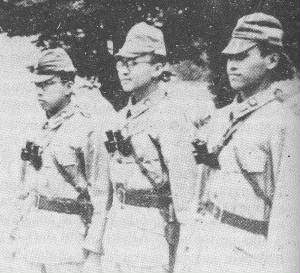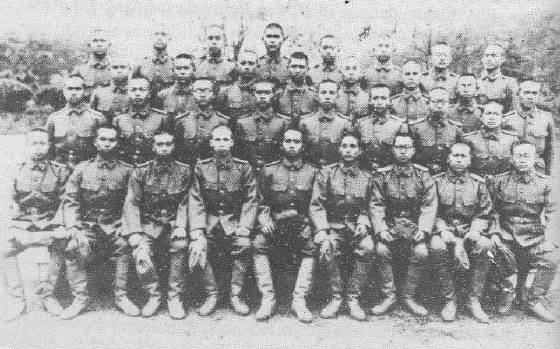|

|
| Yoga Sugama (middle) in Shikan Gaikko. |
Yoga Sugama born in Tegal, Middle Java, on May 12, 1925. Since his childhood, he wants to be a soldier because he admires
some Nazi leaders, especially Hitler and General Erwin Rommel. The reason is simple: he admires them because Germans always
won theirs battles. As adolescent, he start to admire Hitler and his lieutenants because theirs courage.
Yoga Sugama got his chance after Japanese conquered Netherlands East Indies. In 1942, one of his father friend told him that
Japanese military administration in Indonesia want to send some Indonesian youths to theirs country and to educated them as
cadet officers. Yoga became interest with the offering and then enlisted for the examination. He succeeded to pass a Japanese
tight test and send to Japan with 19 other Indonesians from Java.
Before Japanese send them to Japan, Yoga and his friends got some basic military training, especially physical one. He left
Java via Tandjoeng Priok harbor by a freighter and have a chance to visiting Singapore before went to Japan. He and his friends
were very happy during theirs voyage. However, when his ship sail from Singapore to Shimonoseki, in one point an Allied submarine,
perhaps American one, hunted them. Fortunately they could land in Shimonoseki in safety.
From Shimonoseki, Yoga and his friend went to Tokyo by train. In Japan capital, they were sending to Menguroku Tokyo Kokusai
Gakuyukhai, an International Student Centre. In the place they were learn Japan. Everyday they must learn for 8-10 hours.
Thus, when they finished the education they already could read Japan newspaper.
However, Yoga became disappointed when a Gaimusho (Japan Foreign Department) official told him that he couldn't to join Rikugun
Shikan Gaikko (Army Military Academy) yet. Because he couldn't go back to his homeland, Yoga decided to join with Agriculture
Academy in Miyazaki as an alternative.
In Japan, Yoga got many new experiences. He observed that while Japanese were hard workers but they only eat a little bit
food. Only after the war he knew that majority of Japan foodstuffs were send to theirs troops.
The situation made Yoga and his friends always look for more food. Unfortunately, they didn't have many opportunities to satisfy
theirs stomach need. Although sometimes they bought noodles in restaurants, but they face a strange rule: buyers only could
buy a food once and can't order more. In his hunger during the time, Yoga even breaks his Islamic faith rule by eaten dogs
and cats!
Meanwhile, after learn for some months in Agriculture Academy, he got permission from Tokyo to join with Military Academy.
He started his days in Tokyo Military Academy as a ‘heico’ (soldier). In the second year, every cadet got ‘goco’
(corporal) rank; a year later, they became ‘gunco’ (sergeant).
Five Indonesian cadets, including Yoga, joined in Cadet Battalion from ‘Nanjo’ (Southern); the battalion divided
into six ‘khocuthai’. There were many Chinese from Wang Ching Wai collaborationist troops in the battalion. Beside
there were some Burmanesse and Indians in the battalion. Malaysians, Indonesians, and Filipinos cadets were very few.
Everyday, cadets must woke up in 06.00, made some exercises, bathe…Breakfast served one hour later. At 07.30 they joined
in class and got lunch at 13.00. They only have a limited time to relax because from 14.00 instructors lead them to the field
and train them physically until afternoon. Dinner serve at 19.00, then they must join with the class again. They back to theirs
rooms at 23.00.
Every cadet got 2 type uniforms: one for summer and the other for winter. Each type consist 3 models: for everyday use, for
‘gaisyutsu’ (on leave), and for official, especially if Emperor or Tenno Haika made an inspection.
The instructors in Military Academy educated every cadets to became a brave soldiers that would sacrifice himself for theirs
country. One day in August 1943, Ir. Soekarno and Drs. Moh. Hatta and some other Indonesian leaders visiting the academy.
Yoga remembered what Soekarno told to Indonesian cadets: “Good. Please continue your education because it will useful
for our nation struggle later”. Although very short, the meeting gives a deep impression to Indonesian cadets and gives
them more reasons to finishing theirs education.
During theirs first three months, cadets were forbidden to go out from barracks, to smoke, let alone to go to movie. After
the period, they could go out from theirs barrack on Sunday although still can’t go to movie, can’t watch the
operas, and can’t visit public buildings.
Japanese cadets who have family in Tokyo usually visiting them, but they can’t sleep there. Yoga and his friends usually
only walking around the city. But they were forbidden to visit restaurants. Thus, they must bring a typically food from barrack
that called as ‘bento’.
There were military police agents that watching cadets. If they meet, usually the MP would ask them some questions. But the
cadets also have a right to ask theirs IDs.
If there were ‘gaisyutsu’, every cadet could leave the barrack at 08.00, but they must back at 17.00. There was
an obligation for every cadet to write a report about when and where they go. But at least they must visiting ‘jinja’
(temple), like Meijijingu, Yasukunijinja, or others. Sometimes Yoga and his friends forgot to visit the places, but they always
give a false report that they visiting jinja. If theirs instructors know that they were lying, they could be hit at theirs
faces and cursed.
Every time he went out from his barrack, Yoga observed that Japanese civilians became more and more shortcoming in materials
and foodstuffs. Meanwhile, from day to day, many Japanese youths were sending to frontline. The Academy also hit by this situation.
In the second year, Yoga observed that many soldiers no longer wore leather shoes but straw shoes.
In the third year, the cadets got info that a half of them in six ‘Khocuthai’ will be send to China battlefields
if they already graduate. The graduates will get ‘minaraisikan’ (warrant officer) rank. But, before they could
really graduate, they must got battle experience for 6 months.
Meanwhile, the war turns against Japan. Allied bombers start to attack Japan mainland and wrecked many cities and towns. One
day in 1945, the cadets made a recreation in their summer holiday. They went to Niko in north Tokyo by train. But when they
want to back to theirs academy, an American Mustang fighter attacking the train by strafing in low level. Some cadets wounded
and killed. Among the unlucky men was a Yoga friend, Suroso. He died later because his wound.
In other day, American aircrafts attack Yoga unit when they were in training in footsteps of the Fuji Mountain. For 3 or 4
days, the cadets involved in a real battle when American aircrafts flown above theirs heads and bombing them.
Yoga, now hold cadet sergeant rank, was in Tokyo when American dropped atomic bombs in Hiroshima and Nagasaki. The news came
late to cadets because Japanese government forced a tight censor. Two or three days after the bombing of Hiroshima, the cadets
of Military Academy were ordered to back to theirs barracks from theirs training in fields. They were ordered to wear a special
uniform (the number 3), polished their shoes as brightly as possible, and form a line.
Nobody dare to ask. They thought about an Emperor visit because the uniform no. 3 usually wore only for an important agenda,
like dignitaries visiting. However, they were wrong. That morning they were only listened a Tenno Haika speech from a gramophone.
The speech told Japanese people to follow the government and the empire direction to face the subsequent developments. However,
Yoga didn’t know the contents of the speech because it’s high language. They never imagine about the truth situation
of the Pacific War because Japanese only told them that Japan is invincible and Japanese will won the war.
A few days after the speech, Yoga and his cadet friends became confused when they were ordered to form a line and then remove
theirs uniforms, weapons, and rank signs. In roads, MPs were patrol in full alerts with unsheathed bayonets.
Foreign cadets start to ask: “What happen?” Because they only have a few info beside what Japanese told to them,
they didn’t know the world situation at the time. Thus the news of Japanese surrenders was a real surprise for them.
Unfortunately, the academy officials didn’t give a clear instruction about what the foreign cadets can do after that,
except give permission for them to live in the academy gymnasium. During the situation, Yoga and his friends from Indonesia
and other Asian countries only try to keep live in theirs barrack and wait Allied instruction.
After MacArthur troops land in Japan, Yoga work for them as an interpreter. But when he knows about Indonesia independence
proclamation, he quit from the job and went to homeland. He joined with TNI (Indonesian army) during the Indonesia independence
struggle and rose in high rank after the war. Yoga highest rank in the TNI was a general and during Soeharto rule he became
the chief of Indonesian intelligence service, the BAKIN.

|
| Indonesians, Burmanesse, Filipinos, and Malays cadets in Shikan Gaikko |
|



